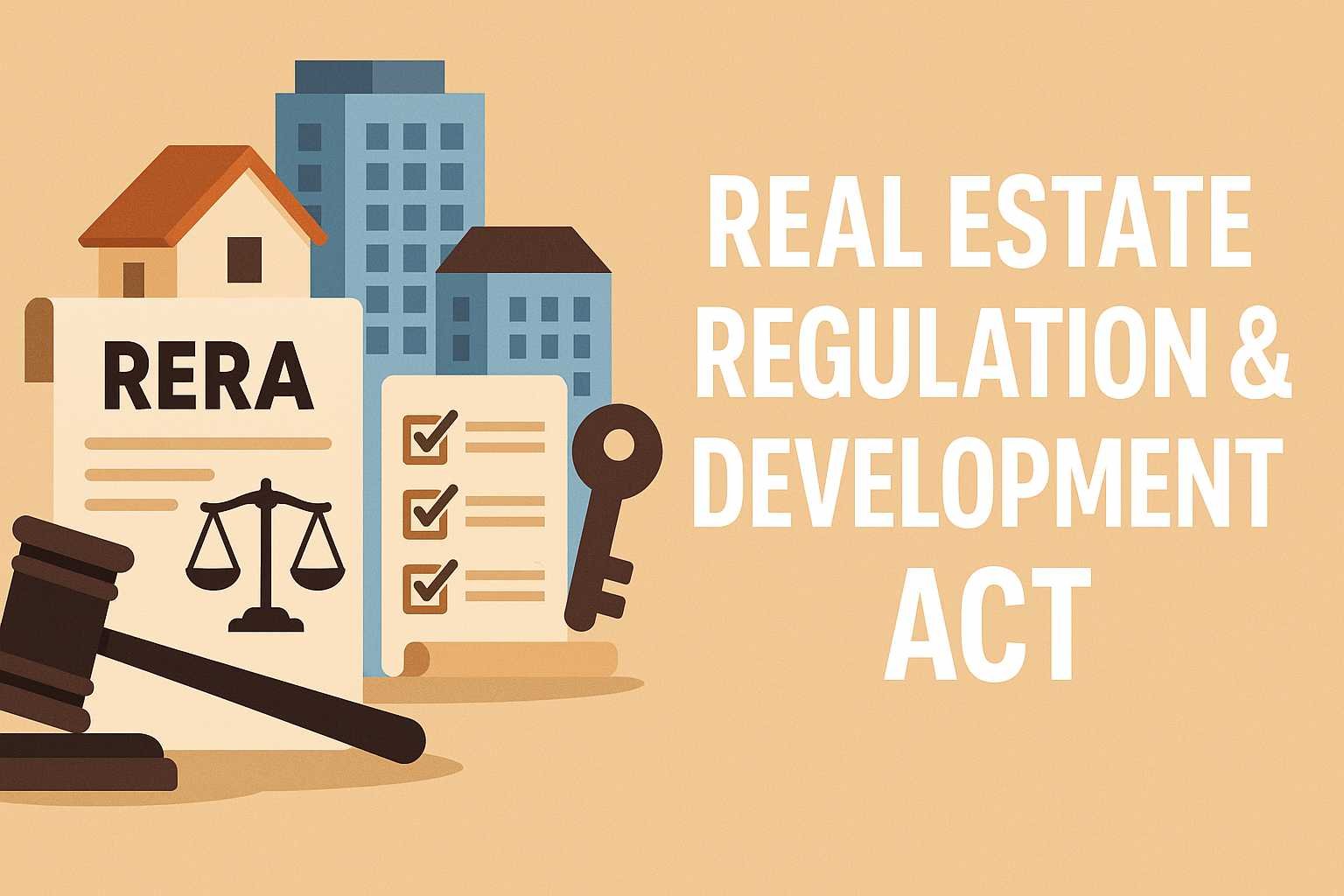On this page you will read detailed information about How RERA Impacts Home Buyers in India.
Buying a home is one of the most significant financial decisions for any individual. Yet, for decades, homebuyers in India faced uncertainty — delays in possession, false promises, lack of transparency, and poor construction quality were common issues.
To address these challenges and restore confidence in the real estate sector, the Real Estate (Regulation and Development) Act, 2016, commonly known as RERA, came into force on 1st May 2017.
This landmark legislation has revolutionized the Indian real estate market, making it more transparent, accountable, and buyer-friendly.
This article explores in detail how RERA impacts homebuyers, the rights and protections it offers, and why it has become a game-changer for India’s housing sector in 2025.
1. What is RERA?
The Real Estate (Regulation and Development) Act, 2016 was enacted by the Parliament of India to regulate the real estate industry and protect homebuyers.
Its primary objectives are:
- To ensure transparency between builders and buyers.
- To prevent project delays and fund diversion.
- To establish a Real Estate Regulatory Authority (RERA) in every state and union territory.
- To create an online system for registration, disclosure, and redressal.
Each state has its own RERA authority — for example, MahaRERA (Maharashtra), UP-RERA (Uttar Pradesh), Delhi-RERA, and so on.
2. Applicability of RERA
RERA applies to:
- All residential and commercial real estate projects exceeding 500 sq. meters or having 8 or more units.
- Ongoing projects that had not received completion certificates before May 2017.
- All real estate agents involved in selling registered projects.
This ensures that both developers and agents are brought under a transparent legal framework.
3. Key Provisions Benefiting Homebuyers
Let’s look at how RERA specifically protects the interests of homebuyers and ensures fairness in transactions.
(a) Mandatory Project Registration
Before advertising or selling any property, developers must register their projects with the state RERA authority.
They must submit:
- Land title documents.
- Approved plans and layout.
- Details of promoters, contractors, and architects.
- Timeline for project completion.
Only after registration is the builder allowed to market or sell units.
Impact on buyers:
This ensures that buyers invest only in legally approved and authorized projects, reducing the risk of fraud or illegal construction.
(b) 70% of Buyer Funds to be Kept in Escrow Account
Under RERA, 70% of the money collected from buyers must be deposited in a separate escrow account.
This fund can only be used for:
- Construction purposes, and
- Land development costs of that particular project.
Impact on buyers:
This prevents fund diversion — earlier, many builders would use money from one project to finance another, leading to massive delays.
Now, RERA ensures that buyer funds are used solely for the project they paid for.
(c) Timely Possession and Compensation for Delays
If a developer fails to hand over the property by the committed date, the buyer is entitled to:
- Full refund with interest, or
- Monthly interest compensation until possession is delivered.
RERA imposes strict penalties and even imprisonment for habitual defaulters.
Impact on buyers:
This has drastically reduced project delays, as builders are legally accountable to deliver within the promised timeframe.
(d) Standardization of Carpet Area
Before RERA, builders often misled buyers using “super built-up area” — which included common spaces, lobbies, and balconies — inflating prices.
RERA mandates that prices must be quoted only based on carpet area, defined as:
“The net usable floor area of an apartment, excluding walls, balconies, and common areas.”
Impact on buyers:
Buyers now pay only for actual living space, ensuring transparency in pricing.
(e) Advance Payment Limit
Developers cannot demand more than 10% of the property’s cost as an advance before signing a registered sale agreement.
Impact on buyers:
This protects buyers from financial exploitation and ensures contractual clarity before any significant payment.
(f) Project Details Must Be Disclosed Online
Every RERA-registered project must display complete details on the official RERA website, including:
- Sanctioned layout plans.
- Construction status updates.
- Project completion schedule.
- Promoter details and pending litigations.
Impact on buyers:
This brings digital transparency, allowing buyers to verify all project details before investing.
(g) Liability for Structural Defects (5-Year Warranty)
If any structural defect or poor workmanship is found within five years of possession, the builder is obligated to:
- Rectify the defect free of cost, or
- Compensate the buyer monetarily.
Impact on buyers:
This gives homeowners a guarantee of quality construction and long-term security.
(h) Penalties for Non-Compliance
RERA has strong enforcement powers:
- Developers can face fines up to 10% of project cost.
- Repeated violations can lead to imprisonment up to 3 years.
- Real estate agents can be blacklisted for non-compliance.
Impact on buyers:
Buyers can now hold builders legally accountable, deterring unethical practices.
In the previous post, we had shared information about Real Estate (Regulation & Development) Act, 2016, so read that post also.
4. Homebuyer’s Rights Under RERA
The Act empowers buyers with several legal rights:
| Homebuyer’s Right | Description |
|---|---|
| Right to Information | Buyers can demand project details including layout, approvals, and completion timeline. |
| Right to Possession | Buyers have a legal right to timely possession of their booked unit. |
| Right to Refund | Full refund with interest in case of project delay, cancellation, or non-delivery. |
| Right to Compensation | Buyers can claim compensation for false advertising or construction defects. |
| Right to Approach RERA Authority | Buyers can file a complaint online against developers or agents. |
5. How to File a Complaint Under RERA
If a buyer faces any grievance — such as delay, false advertisement, or non-delivery — they can file a complaint in five easy steps:
- Visit the respective State RERA website (e.g., maharera.mahaonline.gov.in).
- Click on “File Complaint” or “Grievance Redressal.”
- Fill out the online complaint form with project and promoter details.
- Upload supporting documents and proof of payment.
- Pay the nominal complaint fee (usually ₹1,000–₹5,000).
The RERA authority or Adjudicating Officer must resolve the case within 60 days of filing.
6. Recent Developments (2023–2025)
RERA continues to evolve with new reforms and digital integration.
(a) RERA 2.0 (2023 Initiative)
The Central Government launched RERA 2.0, a reform roadmap focusing on:
- Pan-India data integration across all state RERAs.
- AI-based project tracking for construction and fund utilization.
- Blockchain-powered registry for transparent title verification.
(b) Model RERA Rules (2024 Update)
Uniform model guidelines were introduced to harmonize differences between state RERA authorities — ensuring standard complaint formats, penalties, and reporting.
(c) Homebuyer Empowerment Campaign (2025)
The Ministry of Housing launched a public awareness program educating buyers about their rights and digital tools under RERA.
7. How RERA Transformed the Real Estate Market
The impact of RERA has been tangible and measurable:
- Reduction in project delays: Completion rates increased by over 35% (source: MoHUA, 2025).
- Rise in buyer confidence: Over 1.4 lakh complaints resolved across India since 2017.
- Cleaner developer ecosystem: Non-compliant builders and shell projects reduced significantly.
- Increased FDI inflow: Transparency boosted global investor trust in Indian real estate.
RERA has effectively shifted power from developers to buyers, creating a more balanced and credible housing market.
8. Challenges and Future Outlook
While RERA has made massive progress, challenges remain:
- Uneven implementation across states — some RERA bodies lack resources.
- Delays in adjudication due to rising complaint volume.
- Limited enforcement power against repeat defaulters in certain states.
However, with AI integration, stronger digital monitoring, and stricter penalties, these issues are being gradually resolved.
Conclusion
The Real Estate (Regulation and Development) Act, 2016 (RERA) has transformed the real estate sector from being builder-driven to buyer-centric.
By enforcing transparency, financial accountability, and timely delivery, RERA has given homebuyers confidence, protection, and legal recourse — something that was missing for decades.
As India urbanizes rapidly and real estate demand soars, RERA continues to serve as a cornerstone of ethical housing development.
In 2025 and beyond, RERA not only safeguards homebuyers but also strengthens India’s real estate market by ensuring that trust becomes the true foundation of every home.
Disclaimer
The information and services on this website are not intended to and shall not be used as legal advice. You should consult a Legal Professional for any legal or solicited advice. While we have good faith and our own independent research to every information listed on the website and do our best to ensure that the data provided is accurate. However, we do not guarantee the information provided is accurate and make no representation or warranty of any kind, express or implied, regarding the accuracy, adequacy, validity, reliability, availability, or completeness of any information on the Site. UNDER NO CIRCUMSTANCES SHALL WE HAVE ANY LIABILITY TO YOU FOR ANY LOSS OR DAMAGE OF ANY KIND INCURRED AS A RESULT OR RELIANCE ON ANY INFORMATION PROVIDED ON THE SITE. YOUR USE OF THE SITE AND YOUR RELIANCE ON ANY INFORMATION ON THE SITE IS SOLELY AT YOUR OWN RISK. Comments on this website are the sole responsibility of their writers so the accuracy, completeness, veracity, honesty, factuality and politeness of comments are not guaranteed.
So friends, today we talked about How RERA Impacts Home Buyers in India, hope you liked our post.
If you liked the information about How RERA Impacts Home Buyers in India, then definitely share this article with your friends.
Knowing about laws can make you feel super smart ! If you find value in the content you may consider joining our not for profit Legal Community ! You can ask unlimited questions on WhatsApp and get answers. You can DM or send your name & number to 8208309918 on WhatsApp







